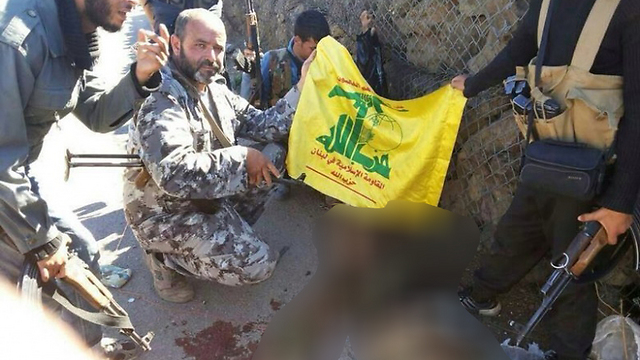Sooner or later, Hezbollah will push Lebanon over the edge
By: Tony Badran/Now Lebanon
Published: 10/10/2014
https://now.mmedia.me/lb/en/commentaryanalysis/564219-sooner-or-later-hezbollah-will-push-lebanon-over-the-edge
Hezbollah is aggressively putting out the message that it is willing to heat things up on the border
On Tuesday, Hezbollah claimed responsibility for planting explosive devices that injured two Israeli soldiers on patrol in the Shebaa Farms area. The incident followed an attempted infiltration into Israel on Sunday by an unidentified squad, which resulted in the death of one Lebanese Armed Forces (LAF) soldier. Tuesday’s operation and Hezbollah’s quick claim of responsibility has left observers puzzling over the group’s calculation. Initial reactions tended to focus on issues of deterrence and the rules of retaliation between the two sides. However, there is more to the story. The attack appears to be part of a broader conversation that the Iranians and Hezbollah are having with the US. Even as the operation targeted Israel, its message was as much aimed at Washington.
Most of the commentary on the attack approached it from familiar angles, such as Hezbollah’s need to shore up its deterrence against Israel. The group has an interest in dispelling misconceptions regarding its capabilities and readiness to confront Israel due to its taxing commitment in Syria. The party also needed to retaliate for a series of blows by Israel. This includes, most recently, the death of a Hezbollah sapper as he was dismantling an alleged Israeli listening device in Adloun last month. Indeed, Hezbollah pointedly named the unit that carried out the attack after this fallen member.
These points all have merit. Following the operation, the party’s second in command, Naim Qassem, affirmed that the operation intended to signal that, “although we are busy in Syria,” the group remained vigilant. Qassem also noted the operation’s specific association with the dead sapper, Hassan Ali Haidar. Whether retaliation for Haidar was the main reason behind the attack is debatable. But tying the operation to Haidar’s death allowed Hezbollah to keep the attack within an accepted framework of limited retaliation, in the hope that the Israelis would in turn restrain their response. However, Hezbollah’s statements on the operation emphasized another angle entirely; namely rebel movement in southern Syria, particularly in the Golan. In brief, Hezbollah is aggressively putting out the message that it is willing to heat things up on the border should Israel, and the US, allow Syrian rebels to advance from the Golan toward southeastern Lebanon.
When an official source in the party first claimed responsibility for the attack through the pro-Hezbollah Al-Mayadeen TV, he twice underscored that the operation was a response to the supposed cooperation between the Syrian rebels and Israel. Another unnamed official elaborated further: “The operation carries a very clear message to the Israelis and their allies — old and new. They are facilitating the transport of weapons and fighters from the hills of Quneitra towards Kfarshouba [in Lebanon],” the official told AFP.
On Wednesday, the pro-Hezbollah Al-Akhbar newspaper reiterated the point, and led its front page with the headline: “A double message: the Shebaa explosive is a warning to Israel and the takfiris against changing the rules of the game.” Indeed, this theme of the Syrian rebels moving in toward southeast Lebanon, with Israeli facilitation, has been at the heart of a systematic Hezbollah information campaign several days ahead of Tuesday’s attack.
Hezbollah, according to its media campaign, considers that any Syrian rebel movement in the Golan area implicitly has Israeli acquiescence, if not active support. What’s more, Hezbollah says it’s worried about the prospect of Israel using the rebels as proxies to open another front against the Shiite party — specifically in the area of Shebaa (northeast of the Farms), Hasbayya and Rashayya.
Hezbollah’s contention that Israel might use Syrian rebels as a proxy force should not be dismissed as mere propaganda that the group doesn’t really believe. Hezbollah very likely sees it as a de facto reality. The group is aware that Israel works closely with Jordan and that it sees opportunities to build a cooperative relationship with Gulf Arab states that back the rebels; hence the Hezbollah official’s reference to Israel’s “old and new” allies. Moreover, Hezbollah is in a tough spot, as evident from the beating it is taking in the Qalamoun hills in Syria. Earlier this week, Jabhat al-Nusra reached the outskirts of the Hezbollah stronghold of Britel in the Bekaa. The party is suffering significant casualties and had one of its fighters abducted in the latest battles. It is fully aware of its vulnerability, and deeply concerned about being embroiled in another front with the rebels in the south — regardless of whether or not such a prospect is realistic at this stage. The warning Hezbollah is sending out is that it would hold Israel responsible for any rebel drive toward southeast Lebanon. Such a scenario, Hezbollah is saying, would nullify the existing rules of engagement in place since 2006.
The intended audience for Hezbollah’s threat is not just the Israelis. For even as Israel was the target of Tuesday’s attack, Hezbollah and its Iranian patrons are actually also communicating with the US. Washington has effectively signed off on an Iranian order in Beirut, using the fight against Sunni jihadists and the preservation of Lebanon’s stability as justification. Iran and Hezbollah want to exploit the US position. They wager that the White House would not wish to see another major conflagration between Israel and Lebanon. Also, the Iranians may calculate that the White House still seeks a broader rapprochement with them. The US and Iran are already partners in Iraq. Now, through its Hezbollah arm, Iran is positioning itself as an interlocutor with the US regarding security on the border with Israel. If Washington wants to keep that border quiet, it needs to talk to Tehran. And, the way the Iranians see it, insofar as the Israelis (and the Jordanians) are US allies, the White House needs to lean on them to make sure that Syrian rebels don’t approach southern Lebanon.
Of course, the reality is that the Party of God remains in a terrible quandary, with no end in sight to its entanglement in the Syrian war. Hezbollah purported to signal that its involvement in Syria has not diminished its readiness to confront Israel. Paradoxically however, Hezbollah’s warnings about Israel’s supposed collusion with the Syrian rebels only underscored how much the Shiite group is consumed by its war with the Syrians. So much so that even its conflict with Israel is increasingly defined by Syria’s dynamics.
Hezbollah is playing a dangerous game. It has already brought Lebanon to the edge. Sooner or later, it’s bound to push it over.
**Tony Badran is a research fellow at the Foundation for Defense of Democracies. He tweets @AcrossTheBay.
Home LCCC English Daily Detailed News Bulletins Tony Badran/Sooner or later, Hezbollah will push Lebanon over the edge
















